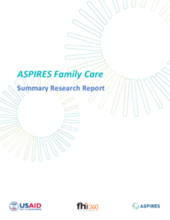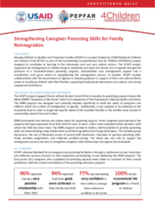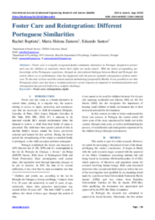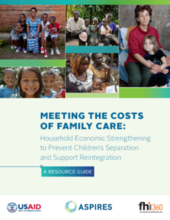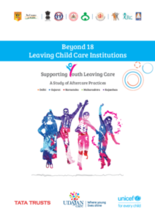Displaying 391 - 400 of 962
The Accelerating Strategies for Practical Innovation and Research in Economic Strengthening (ASPIRES) Family Care Project focused on how economic strengthening (ES) interventions can help prevent unnecessary separation of children from families as well as support the reintegration into family care of children who were already separated. This mixed methods evaluation was implemented alongside programming that included longitudinal quantitative data collection with all participating FARE and ESFAM households at three time points to assess a range of indicators related to household economic and family well-being, as well as in-depth, longitudinal qualitative research to help understand how (well), from participants’ perspectives, the FARE and ESFAM interventions aligned with perceived drivers of separation and families’ experienced child-level effects of programming.
This Practitioner Brief from the the Coordinating Comprehensive Care for Children (4Children) project presents key learning and recommendations from the Keeping Children in Healthy and Protective Families (KCHPF) project in Uganda, which supported the reintegration of children living in residential care back into family care through the provision of a household-based parenting program, individualized case management support and a reunification cash grant aimed at strengthening the reintegration process.
In this qualitative study, attorneys, caseworkers, managers, and service providers from four jurisdictions are interviewed to understand practice and decision-making in reunification case planning and service delivery.
This article examines the family reintegration process for those in care in Portugal and Brazil.
This resource guide aims to assist program designers, funders, and implementers to select and incorporate appropriate and effective household economic strengthening (HES) measures into programs to preserve or reestablish family care for children.
This article examines the challenges encountered by, and the opportunities available to, young adults as they transition from informal kinship-based foster care to independent living in the Bikita District of Zimbabwe.
This study from Family Care First (FCF) and Responsive and Effective Child Welfare Systems Transformation (REACT) utilized a mixed method approach to data gathering and analysis to understand the effects of gender, identity, and institutional practices on the well-being of children in alternative care in Cambodia.
The special issue of Emerging Adulthood titled “Care-Leaving in Africa” is the first collection of essays on care-leaving by African scholars. This article, coauthored by scholars from North and South, argues in favor of North–South dialogue but highlights several challenges inherent in this, including the indigenizing and thus marginalizing of African experience and scholarship and divergent constructions of key social concepts.
This report on Aftercare is based on research on “Current Aftercare Practices” (CAP), with regard to Children in Need of Care and Protection (CNCP), under the Juvenile Justice (JJ) Act, 2015, conducted in five states of India: Delhi, Gujarat, Karnataka, Rajasthan and Maharashtra. It is about the status of Aftercare youth, or Care Leavers (CLs) transitioning from state care to adulthood in the wider community.
This mixed‐methods study presents data on the needs and availability of support of 222 Israeli care‐leavers, suggesting that the most urgent needs of care‐leavers are a lasting need for a stable and available support figure and assistance with educational issues.

